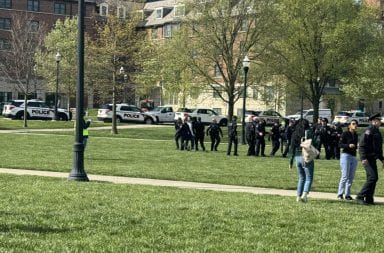The two Undergraduate Student Government ballot initiatives concerning USG member benefits and a scholarship fund cannot be ratified as written, USG members said.
The first initiative proposes the elimination of all benefits for the USG president and vice president.
Currently the USG president and vice president receive money to cover in-state tuition, room and board and other academic costs. The benefits are funded by a privately funded scholarship – the Richard Mall memorial scholarship – and a general operations budget.
Because a portion of the funding is from a private source, the initiative cannot affect the scholarship from being offered to the president and vice president.
The president and vice president can turn the scholarship down, but the money cannot be reallocated to students. If turned down, the money is left in the account until the next academic year, Mason said.
Nick Benson, sponsor of both initiatives, said he was not aware of the private contributions to the benefits until last night.
He said that if that is the case then the initiative is to focus on the public-funded aspects of the benefits.
Benson, senator for the College of Social and Behavioral Sciences, said he sponsored the initiative because he was concerned about presidential and vice presidential candidates motives for running and the lack of similar benefits for other student organization leaders.
“It’s my belief that somebody who wants to be USG president should do it out of genuine desire to serve and it should be something that you volunteer to do,” said Benson, who is also a senator for the College of Social and Behavioral Sciences.
Aftab Pureval, USG president, said the scholarship allows USG president and vice president positions “to be open to students who might not have a strong financial background or a have a lot of money at their disposal.”
“(The USG president and vice president) can’t hold any other paid employment during their term of office,” said Matt Couch, USG adviser and assistant director of the Ohio Union.
“The person give a lot of themselves and time and energy,” Pureval said. “It’s pretty much impossible for that person to have another job.”
The USG president and vice president are not the only student leadership positions that receive scholarships like this. Both the presidents and vice presidents of the Council of Graduate Students and Interprofessional Students receive the scholarship, Couch said.
The second initiative calls for taking 25 percent of USG’s budget to create a undergraduate scholarship fund. The $50,000 will be equally divided among need-based and merit-based scholarships.
No scholarship will be more than $1,000 per year per student and the program will be adminstered with faculty oversight, according to the initiative.
Benson said he reviewed the USG budget for the last two years.
“In looking in those budgets you can find very easily $50,000 worth of waste – money that was spent simply because it existed, not because it was necessary to spend,” Benson said.
He said it was incidents of overspending that compelled him to want to reduce the budget and put money toward the a main concern of students – tuition.
The USG budget is funded by the Student Activity Fee and the Coca-Cola fund, about 75 percent and 25 percent, respectively, said Deb Mason, USG vice president.
Mason said that because some of this money comes from students, it can not be reallocated into a scholarship fund.
“We’re not allowed, due to (Council of Student Affairs) guidelines, to use CSA money for personal scholarships,” Pureval said.
However, Benson said that the USG budget already funds a scholarship program – the Beanie Drake scholarship.
Purveal said this is a gray area. Silverman said she did not think the USG adminstration who decided to allocate money from the knew about the rules prohibiting this.
The Beanie Drake program provides scholarships to students who can’t be involved because they can’t afford to be involved with campus activities because
Initiatives are not considered actions. They are considered advisories, said Kara Silverman, EGB director.
“I perceive the purpose of having these initiatives on the ballot as a way for next year’s USG administration to be able to collect a body of evidence and to show the Council of Student Affairs and the university administration that undergraduate students feel a certian about these issues,” Couch said.
Any initiatives that are passed would need action taken by next year’s USG adminstration as long as they do not violate any USG bylaws or legal laws.
According to Elections Governance Committee bylaws, there are no rules regarding content or validity of the initiatives.
“It is my understanding that USG is bound to follow the results of any ballot initiative sponsored by students,” Benson said.
Purveal said he was unaware of this stipulation in USG bylaws.


